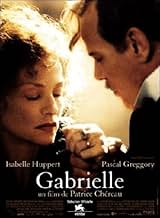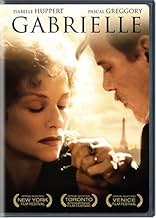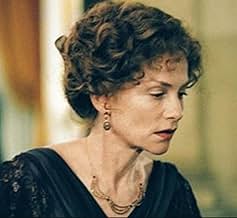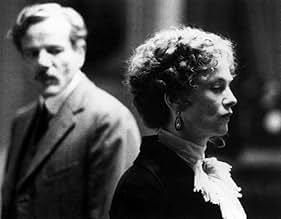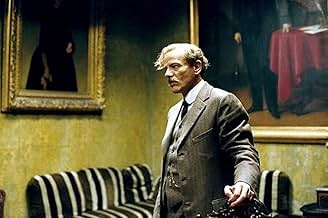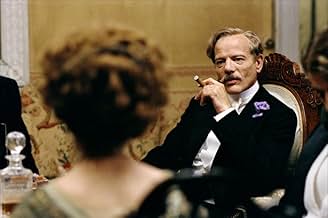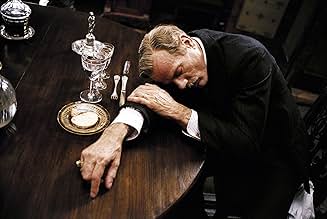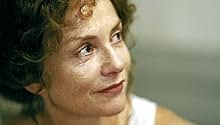Gabrielle
- 2005
- 1h 30min
NOTE IMDb
6,2/10
2,2 k
MA NOTE
Le mariage entre Gabrielle et Jean commence à s'effilocher après la découverte d'une lettre qui appartient à Gabrielle.Le mariage entre Gabrielle et Jean commence à s'effilocher après la découverte d'une lettre qui appartient à Gabrielle.Le mariage entre Gabrielle et Jean commence à s'effilocher après la découverte d'une lettre qui appartient à Gabrielle.
- Réalisation
- Scénario
- Casting principal
- Récompenses
- 3 victoires et 6 nominations au total
Florent Bigot de Nesles
- Invité
- (non crédité)
Philippe Calvario
- Guest
- (non crédité)
Avis à la une
9RNQ
Patrice Chéreau and his team continue to amaze. Their recent movies--"Intimacy" and "Son frère"--have been wild, and Isabelle Huppert has played some wild roles too. But "Gabrielle" is a masterpiece of control, an equal of the studio movies of Fritz Lang in the 1940s. A benchmark is Hitchcock's "Rebecca." Like those movies, every shot here, each turn of the head, is a statement of emotion (and a test of the actors' skill). Now not only music tells what the characters are doing, light is further nuanced with color. The almost-homage to black-and-white is astonishing, because it can also be lit into color, showing the characters' being forced to be here and now without escaping to old assumptions: a bitten lip bleeds red, a serving woman elaborately brings a softly glowing lamp upstairs. (A friend objects that the house has electricity, but the same friend puts candles on the dinner table, and this lamp has a purpose.) There's a thesis in Film Studies for the communicative devices of each scene and what is referenced, like the way there is a less flamboyant version of scenes in Ruiz's "Le temps retrouvé." But then being restrained is the theme, and the tension is extreme without any thunderstorm or overt thrill (a thrill for these characters might be the horror). If the source story was Conrad's homage to Henry James, here is a movie worthy of their capacity for narrative of the highest watchfulness and precision. Stay totally alert, movie goers.
Joseph Conrad wrote his novella, "The Return" in tribute to Henry James, whose "The Spolis of Poynton" inspired him to write about a man who regards people as objects of ownership-- and is gobsmacked when his most prized possession, his wife, walks out on him. On the page it's a tight little chamber piece, with overtones of Ibsen and Strindberg. On the screen the great Patrice Chereau turns it into something else -- an opera in which the images sing rather than the performers. Pascale Greggory is in top form as a haute bourgeois "man who has everything" whose smugness masks a total disdain for feeling. When the superb Isabelle Huppert leaves a note to say she's leaving, the brandy decanter he drops echoes like the sword of Siegfried in Chereau's famed production of Wagner's "Ring" cycle. (Fabio Vacchi's amazing Alban Berg-like score seals the deal on this aspect of the work.) The dramatic set-to that results finds our non-hero groping for words to speak to the feelings he's never experienced before -- longing, regret, and finally grief at the loss of a love he's never allowed himself to know.
As far from Merchant-Ivory as one can possibly imagine Chereau and production designer Olivier Radot (new to la famille Chereau) place the action in a museum-like mansion where a small army of servants move about at the service of this infernal couple and their friends. Scenes of their fashionable parties suggest the Verdurins in Proust with cinematographer Eric Gauthier indulging in a color palette that makes the screen seem like a Manet come to life.
Chereau is doubtless familiar with what Georges Bataille wrote of Manet: "A little superficial perhaps, but driven by inner forces that gave him no rest, Manet was possessed by a desire for something beyond his reach which he never fully understood and which left him for ever tantalized and unsatisfied, on the brink of nervous exhaustion." That's perfect description of the emotional heart of this very great film.
As far from Merchant-Ivory as one can possibly imagine Chereau and production designer Olivier Radot (new to la famille Chereau) place the action in a museum-like mansion where a small army of servants move about at the service of this infernal couple and their friends. Scenes of their fashionable parties suggest the Verdurins in Proust with cinematographer Eric Gauthier indulging in a color palette that makes the screen seem like a Manet come to life.
Chereau is doubtless familiar with what Georges Bataille wrote of Manet: "A little superficial perhaps, but driven by inner forces that gave him no rest, Manet was possessed by a desire for something beyond his reach which he never fully understood and which left him for ever tantalized and unsatisfied, on the brink of nervous exhaustion." That's perfect description of the emotional heart of this very great film.
10Peegee-3
This incredible adaptation of Joseph Conrad's story,"The Return" has been haunting me for days. The visual beauty of its cinematography in contrast to the devastating psychological and emotional pain of its characters, brilliantly portrayed by Isabelle Huppert and Pascal Gregory. has rarely been achieved in film. No need here to repeat the details of the story...I do however want to point out what I have not read in any reviews or comments...that this is basically, as I see it, an evocation of the power and control struggle in a marriage...that moves between husband and wife in the most fascinating and brilliant way. My most grateful appreciation and admiration to Patrice Chereau for giving us this remarkable film. In a time of blockbuster, action movies, what a joy to experience a work of art that provides intense emotion, intelligent food for thought and visual nurturance.
French language period set chick flick that was so banally turgid and pretentious that I wanted to scratch thine own eyes out in those brief lucid periods I was awake. One thing I did share with what I expect the females in the audience were experiencing was the shedding of tears, the stark difference being that mine were tears of blood. If it had been a play I would have rushed out, brought a gun, then rushed back to shoot the actors on stage for in my opinion they deserve nothing but death. Put briefly, in turn of the century Paris a rather arrogant man rather abruptly finds out that his wife of 10 years desires to leave him for another man. Much talking is done. Then much more talking is done. This is followed by lengthy periods of talking. More talking. Then wrapped up with, surprisingly, talking. But it's all done in an almost monologue method , briefly interspersed with large titles on screen which I expect the makers of the movie thought to be profound yet I found completely ridiculous (the film ends with the words "AND HE NEVER RETURNED!". I thought it rude of me to puke on the floor of so gorgeous a theatre (the State in Sydney, such a beautiful and elaborate place) so I resisted with all my might). I left the cinema with a headache. Not in any way due to the complexity and depth of the story I'd just seen, but because I just wasted what I now consider to be the most valuable 90 minutes of my life ever. Even now I want to cry.
I see a great number of art-house films, so I'm not a pop culture heathen and I own many great titles in my own private DVD collection that I watch and treasure. I have nothing against glacial pacing, indeed for many wonderful films it is often delicious to slowly savour the unfolding occurrences (In My Fathers Den, Lantana, Insomnia, Mar Adentro etc) and my own favorites are indie films like Requiem For A Dream and Mysterious Skin (tho honestly a film one need watch only once due to its power and disturbing subject matter). But in this instance I would never have thought a "French language art-house drama" would be the type of film that in my opinion, gives the Adam Sandler film The Waterboy a run for it's money.
Complete dross.
I see a great number of art-house films, so I'm not a pop culture heathen and I own many great titles in my own private DVD collection that I watch and treasure. I have nothing against glacial pacing, indeed for many wonderful films it is often delicious to slowly savour the unfolding occurrences (In My Fathers Den, Lantana, Insomnia, Mar Adentro etc) and my own favorites are indie films like Requiem For A Dream and Mysterious Skin (tho honestly a film one need watch only once due to its power and disturbing subject matter). But in this instance I would never have thought a "French language art-house drama" would be the type of film that in my opinion, gives the Adam Sandler film The Waterboy a run for it's money.
Complete dross.
I've been watching & thoroughly enjoying Isabelle Huppert's films since 'The Lacemaker'. This time, what struck me was the intensity of Huppert's next-to-passive, almost casually indifferent postures of contempt for her husband. It is because of her being so minimal and apathetic that her performance harnesses its power and devastation. And this is what enhances Greggory's reactive performance as being so complementary, that of a once smug now tortured soul who slips and struggles to re-grasp a heart turned cold. He's just left grabbing air in the end. The looks on the faces of the chorus, their social clique & the servants in the troubled Hervey household says it all.
Going in, I was reminded of another story of martial discord, David Hughes Jone's 'Betrayal' but 'Gabrielle' hit me as being more incisive and oppressive than anything I've seen adapted for Pinter. I don't need to state the obvious that parlor films of this variety appeal only to those with an acquired taste. As for me, I can only say that I prefer the ice cubes that go with my scotch jagged & stinging cold like the ingredients in this film.
Going in, I was reminded of another story of martial discord, David Hughes Jone's 'Betrayal' but 'Gabrielle' hit me as being more incisive and oppressive than anything I've seen adapted for Pinter. I don't need to state the obvious that parlor films of this variety appeal only to those with an acquired taste. As for me, I can only say that I prefer the ice cubes that go with my scotch jagged & stinging cold like the ingredients in this film.
Le saviez-vous
- ConnexionsReferenced in New York - Section criminelle: Blind Spot (2006)
Meilleurs choix
Connectez-vous pour évaluer et suivre la liste de favoris afin de recevoir des recommandations personnalisées
- How long is Gabrielle?Alimenté par Alexa
Détails
Box-office
- Montant brut aux États-Unis et au Canada
- 332 829 $US
- Week-end de sortie aux États-Unis et au Canada
- 30 676 $US
- 16 juil. 2006
- Montant brut mondial
- 2 775 311 $US
- Durée1 heure 30 minutes
- Couleur
- Mixage
- Rapport de forme
- 2.35 : 1
Contribuer à cette page
Suggérer une modification ou ajouter du contenu manquant


